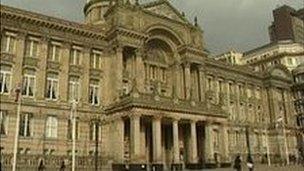Unemployed people in Birmingham to pay council tax
- Published

The council said the most vulnerable people would still be protected from paying
Some unemployed people in Birmingham will have to pay council tax for the first time because of government cuts, the city council has said.
The Labour-controlled authority said a 10% reduction in government funding had left it £11m short for a tax benefit scheme.
The scheme pays tax bills for people who are out of work or on benefits.
From April, people will have to contribute about £200 but the authority will still cover 80% of their bill.
The elderly, families with young children and families with someone with disabilities would still be protected from having to pay, the authority said.
Deputy leader Ian Ward said the council had carried out a consultation on the plans and that "49% of people who responded thought we were adopting the correct approach".
He said: "What we have sought to do is protect the most vulnerable of Birmingham citizens but for unemployed people who are not in a protective category , they will now have to make a contribution at around 20% of their council tax liability."
"It's because the government have top sliced the budget for council tax benefit and left us £11m short."
'Dependent on benefits'
The authority said it had awarded £100m of council tax benefit to about 135,000 households in 2011-12.
Yvonne Davies from the Birmingham Citizens Advice Bureau (CAB) said more people were coming to the CAB because "they are already having difficulty paying their bills".
She said: "The worries I have are for those people who are on low income wages or those who are in part-time work who are already dependent on benefits to make ends meet.
"People are desperate to find more work, extra hours to increase their earnings, but there isn't any work out there for people."
The Department for Communities and Local Government (DCLG) said an estimated £200m was paid out unnecessarily on council tax benefit in 2011-12.
A DCLG spokesman said: "There is a real incentive for councils to get people back into work and make savings in the new localised system from cutting fraud and error.
"To assist, the government has announced an additional £100m to help develop good local schemes and promote best practice."
- Published17 July 2012
- Published11 July 2012
- Published8 February 2012
- Published8 January 2012
- Published1 March 2011